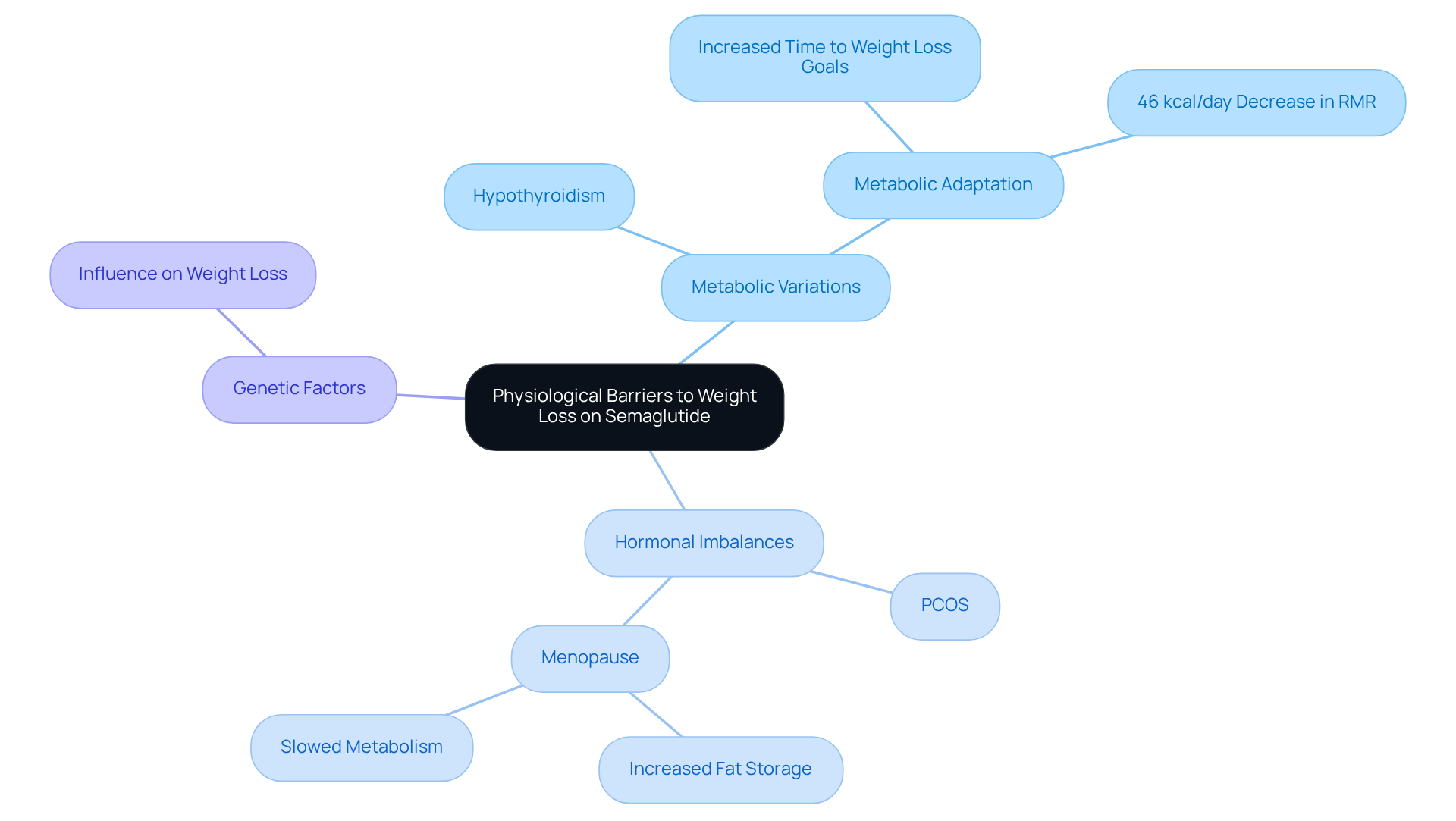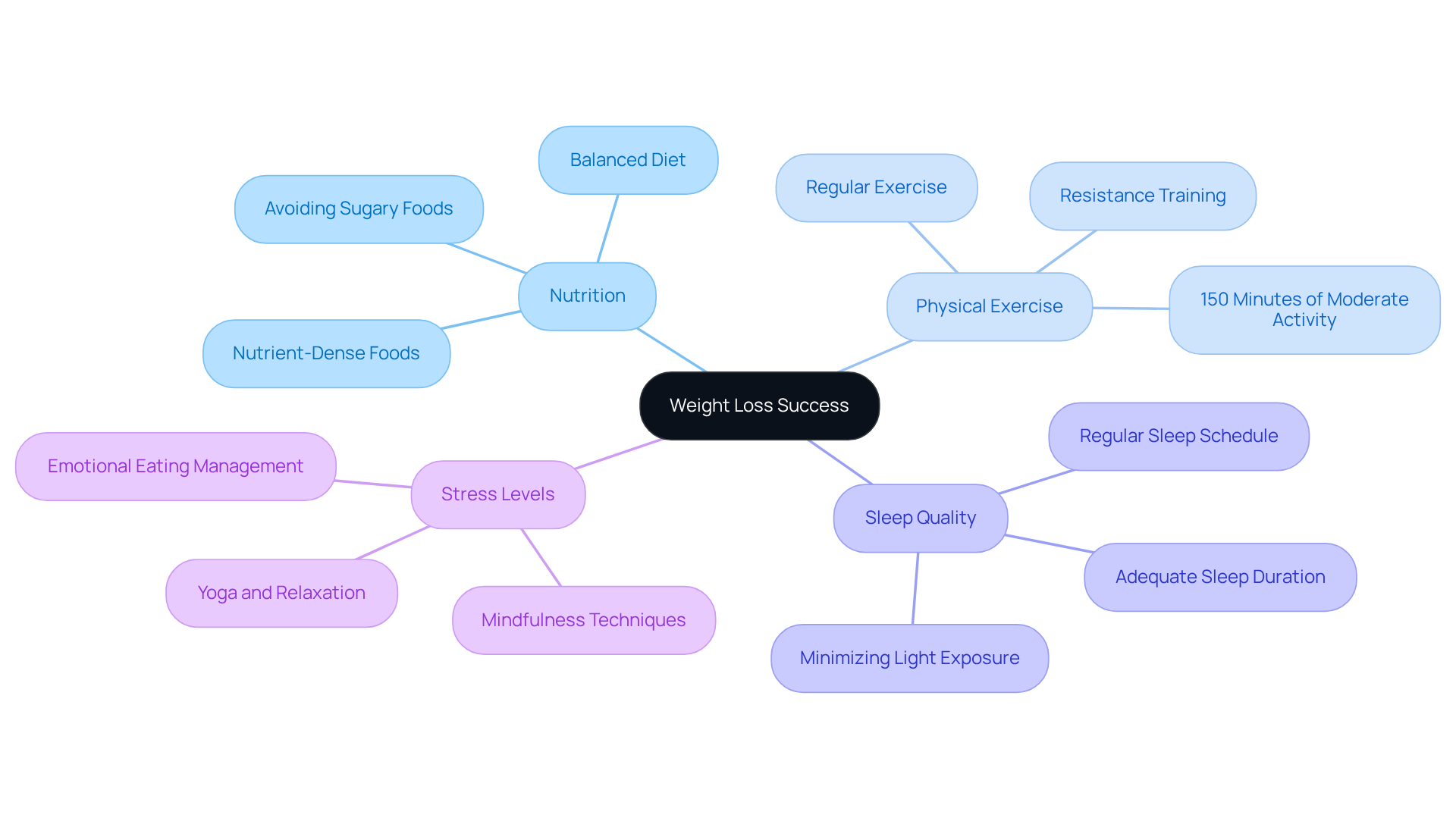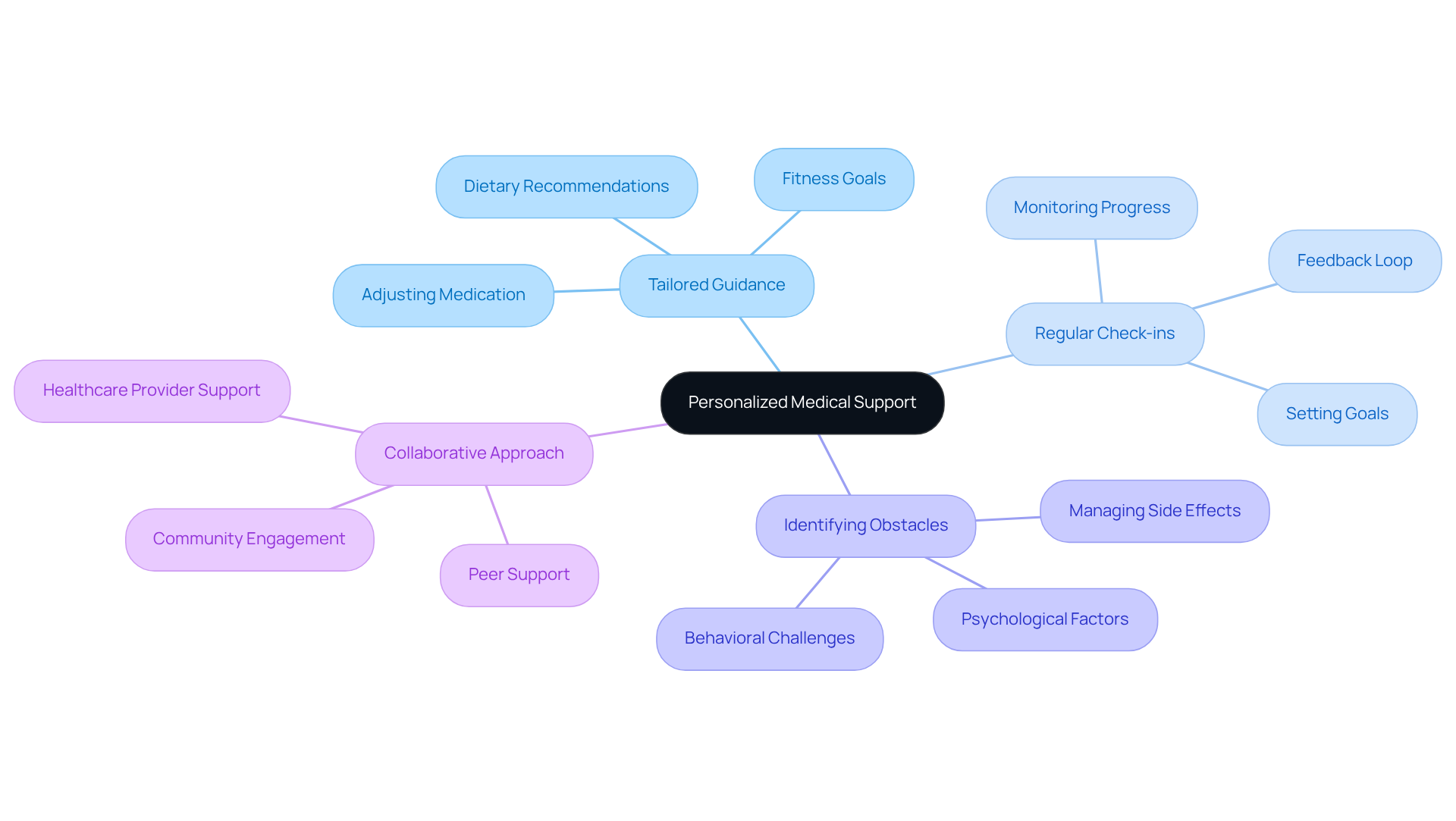Overview
We understand that many individuals face challenges in losing weight, even when using Semaglutide. It can be frustrating to put in the effort and not see the results you desire. You’re not alone in this journey, and there are several key factors that can impact your weight loss efforts.
- Physiological barriers, such as metabolic variations and hormonal imbalances, can play a significant role in hindering progress.
- Additionally, lifestyle choices, including diet and exercise habits, are crucial components that can either support or obstruct your goals.
- It’s essential to recognize that these challenges are not insurmountable.
Moreover, the necessity of personalized medical support cannot be overstated. Tailored strategies that consider your unique circumstances can make a world of difference. Ongoing healthcare guidance is vital in navigating these obstacles effectively. By working closely with healthcare professionals, you can develop a plan that addresses your specific needs and helps you stay on track.
In conclusion, remember that achieving your weight loss goals is a journey that requires patience and support. With the right strategies and guidance, you can overcome these challenges and move closer to your desired outcomes. You’re not alone, and there is hope for a healthier future.
Introduction
Navigating the complexities of weight loss can often feel like wandering through a maze, especially for those using Semaglutide, a medication designed to support this journey. We understand that while many find success, others face challenges that can leave them questioning their progress.
This article explores the critical factors that influence weight loss on Semaglutide. From physiological barriers and hormonal imbalances to lifestyle choices and the importance of personalized medical support, we aim to shed light on what might be holding you back.
What hidden obstacles could be preventing you from reaching your weight loss goals? You’re not alone in this journey, and together, we can uncover tailored strategies that may unlock your potential for success.
In addition, we’ll share insights and relatable scenarios to help you feel connected and supported as you navigate this path.
Identify Physiological Barriers to Weight Loss on Semaglutide
We understand that shedding pounds can be a challenging journey, especially when faced with physiological obstacles like metabolic variations, hormonal imbalances, and underlying health conditions. For instance, individuals with hypothyroidism often experience a slower metabolism, making weight loss efforts feel even more daunting. Hormonal changes, particularly in women during menopause, can lead to increased fat storage, further complicating the process. Additionally, genetic factors may influence how easily someone gains or loses weight, underscoring the importance of recognizing these challenges for effective body composition management.
Research highlights that metabolic rates can vary significantly from person to person. This means that while Semaglutide may yield positive results for some, those who do not see similar success may be questioning why am I not losing weight on Semaglutide due to these physiological differences. A study published in the Journal of Clinical Endocrinology & Metabolism reveals that metabolic responses to weight loss medications can be influenced by genetic factors, reinforcing the need for personalized approaches in body management strategies.
Endocrinologists emphasize that hormonal imbalances can greatly impact why am I not losing weight on Semaglutide. Dr. Neetu Gupta points out that conditions like PCOS and hypothyroidism can significantly contribute to why am I not losing weight on Semaglutide. She advocates for a combination of medical treatments and lifestyle changes to effectively tackle these challenges. Moreover, metabolic adjustments that occur after weight loss can prolong the time needed to reach body reduction objectives. Studies show that for every 10 kcal/day increase in metabolic adjustment, the time to achieve weight loss goals extends by one day.
Understanding these physiological obstacles is crucial for patients as they manage their expectations and collaborate with healthcare providers to develop personalized strategies that address their unique challenges in weight loss. It’s also important to recognize that GLP-1, a key component of the medication, has been shown to enhance insulin release, reduce glucagon levels, and promote feelings of fullness. This makes it a valuable tool in managing body weight. The FDA has approved GLP-1 receptor agonists for the management of Type 2 diabetes, and ongoing research continues to explore its effectiveness in weight reduction, highlighting the necessity for tailored treatment strategies at CT Medical Weight Loss & Beyond.

Examine Lifestyle Factors Affecting Weight Loss Success
Lifestyle elements such as nutrition, physical exercise, sleep quality, and stress levels are crucial in understanding why am I not losing weight on semaglutide. We understand that managing these aspects can be challenging, but they are essential for achieving lasting change. While this medication effectively reduces appetite and caloric intake, sticking to a balanced diet rich in nutrient-dense foods is vital. At CT Medical Nutrition & Beyond, we’re here to support you with customized dietary plans tailored to your specific needs. Our 10 Point Touch System ensures you receive the organized assistance necessary for lasting results, featuring regular check-ins through weekly or monthly appointments. Remember, poor dietary choices, particularly those high in sugar and processed ingredients, can raise concerns such as ‘why am I not losing weight on semaglutide’ and undermine the benefits of your medication.
In addition, consistent physical exercise is equally important for enhancing your body composition. A sedentary lifestyle can lead to stagnation, prompting the question of why am I not losing weight on semaglutide, even with medication. That’s why we offer app-based exercise programs designed to fit your lifestyle and goals, helping you stay active and engaged. Research shows that incorporating exercise not only aids in reducing body mass but also improves overall health and metabolic function. For instance, participating in at least 150 minutes of moderate-intensity or 75 minutes of high-intensity exercise each week can significantly enhance your fat reduction outcomes.
Moreover, managing stress is crucial. Elevated stress levels can lead to emotional eating and hormonal shifts that encourage weight gain. Techniques like mindfulness, yoga, and ensuring you get enough sleep can help mitigate these effects. Quality rest is especially important; studies indicate that inadequate sleep can hinder your fat reduction efforts and increase appetite due to hormonal imbalances. By addressing these lifestyle elements with the support of CT Medical Weight Management & Beyond, you can improve your chances of achieving lasting reductions in body mass, which may help answer the question of why am I not losing weight on semaglutide. You’re not alone in this journey, and we’re here to help you every step of the way.

Understand the Importance of Personalized Medical Support
Tailored medical assistance is essential for those using Semaglutide, a specially blended medication, to reduce body mass at CT Medical Weight Management & Beyond. We understand that each person’s journey is unique, which is why our healthcare providers offer personalized guidance based on your distinct health profile, including your medical history, lifestyle, and specific fitness goals.
Regular check-ins are a vital part of our approach. They allow us to adjust medication dosages, dietary recommendations, and exercise plans, ensuring that your treatment remains effective and aligned with your individual needs. You’re not alone in this journey; we’re here to support you every step of the way.
Moreover, our healthcare experts can help identify and address any obstacles you might encounter in your weight loss journey, such as why am I not losing weight on semaglutide. This includes managing side effects from the medication or addressing psychological factors that may hinder your progress, which can lead to questions like why am I not losing weight on semaglutide. Tirzepatide works by mimicking hormones that regulate appetite, helping to reduce cravings and promote a feeling of fullness.
Research shows that individuals who receive ongoing support from healthcare professionals are more likely to achieve and maintain significant weight loss compared to those who try to manage their weight alone. This highlights the importance of a collaborative approach in weight management, especially when using effective pharmacological interventions like Semaglutide and Tirzepatide. Together, we can navigate this path towards a healthier you.

Conclusion
Understanding the complexities of weight loss on Semaglutide can feel overwhelming, and you’re not alone in this journey. Many factors influence individual outcomes, including:
- Physiological barriers
- Lifestyle choices
- The need for personalized medical support
By addressing these multifaceted challenges, you can navigate your weight loss journey more effectively and set realistic expectations.
Metabolic variations, hormonal imbalances, and health conditions like hypothyroidism and PCOS can significantly impact your weight loss efforts. It’s crucial to recognize the importance of:
- A balanced diet
- Regular physical activity
- Stress management alongside Semaglutide use
Moreover, personalized medical support is vital, ensuring you receive tailored guidance that aligns with your unique health profile and weight loss goals.
Ultimately, achieving weight loss success with Semaglutide requires a comprehensive approach. This means combining medication with lifestyle adjustments and ongoing medical support. Embracing this holistic strategy can empower you to overcome obstacles and foster a sustainable path toward better health.
Taking proactive steps, such as seeking professional guidance and making informed lifestyle choices, can significantly enhance the effectiveness of Semaglutide and lead to lasting results. Remember, you have the support you need to succeed, and every small step you take brings you closer to your goals.
Frequently Asked Questions
What are some physiological barriers to weight loss when using Semaglutide?
Physiological barriers to weight loss on Semaglutide include metabolic variations, hormonal imbalances, and underlying health conditions. For example, hypothyroidism can lead to a slower metabolism, while hormonal changes during menopause can increase fat storage.
How do metabolic rates affect weight loss results with Semaglutide?
Metabolic rates can vary significantly among individuals, meaning that while some may experience positive weight loss results with Semaglutide, others may not see similar success due to these physiological differences.
What role do hormonal imbalances play in weight loss challenges?
Hormonal imbalances, such as those caused by conditions like PCOS and hypothyroidism, can greatly impact weight loss efforts on Semaglutide. These conditions can hinder the effectiveness of weight loss medications.
How do genetic factors influence weight loss on Semaglutide?
Genetic factors can influence how easily a person gains or loses weight, which may affect their response to weight loss medications like Semaglutide. This underscores the importance of personalized approaches in body management strategies.
What is the impact of metabolic adjustments after weight loss?
Metabolic adjustments that occur after weight loss can prolong the time needed to achieve weight loss goals. Research indicates that for every 10 kcal/day increase in metabolic adjustment, the time to reach weight loss objectives extends by one day.
How does GLP-1 contribute to weight management?
GLP-1 enhances insulin release, reduces glucagon levels, and promotes feelings of fullness, making it a valuable tool in managing body weight. It is also approved by the FDA for managing Type 2 diabetes.
Why is it important to work with healthcare providers when managing weight loss?
Understanding physiological obstacles is crucial for patients to manage their expectations and collaborate with healthcare providers to develop personalized strategies that address their unique weight loss challenges.




